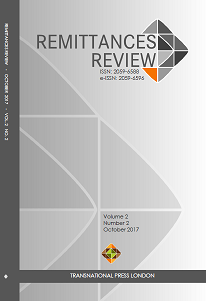More than a criminal tool: the Hawala system’s role as a critical remittance channel for low-income Pakistani migrants in Dubai
More than a criminal tool: the Hawala system’s role as a critical remittance channel for low-income Pakistani migrants in Dubai
Author(s): Froilan T. Malit, Mouawiya Al Awad, George NaufalSubject(s): International relations/trade, Migration Studies, Financial Markets, Globalization, Socio-Economic Research
Published by: Transnational Press London
Keywords: Hawala; low-income migrants; unregulated remittances; Pakistan; Dubai;
Summary/Abstract: This paper examines how and why migrants remit through unauthorized remittance channels (namely the hawala or hundi) and investigates the hawala's developmental roles and effects on migrants’ socioeconomic status. Applying a qualitative case study of 30 low-income Pakistani migrants in Dubai, we argue that the thriving yet unauthorized status of the hawala system is a unique product of global migration process. In contrast to the dominant literature on the nexus between the hawala and terrorist and criminal-related financing, we assert that the sustainability of the hawala is the result of an ongoing effort of low-income migrants to increase their remitting power, providing money that is crucial to their families’ socioeconomic status within the context of rapidly globalizing forces. This study provides both important empirical and theoretical insights into the hawala's complex relevance for low-income migrants, governments, and international organizations in global migration context.
Journal: Remittances Review
- Issue Year: 2/2017
- Issue No: 2
- Page Range: 63-88
- Page Count: 26
- Language: English

